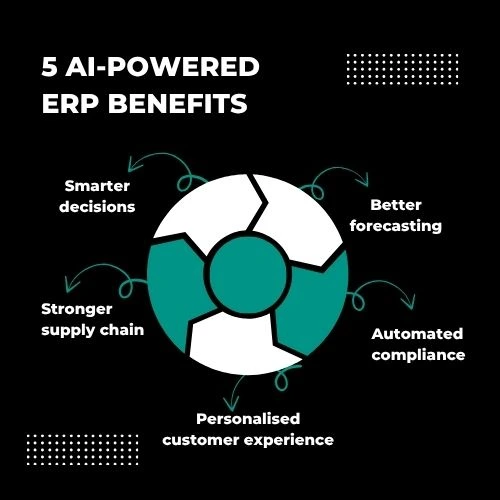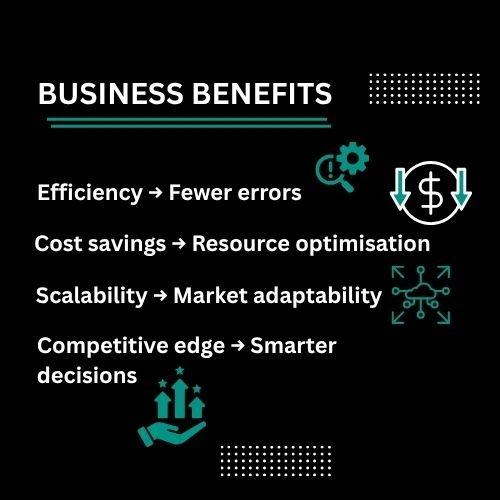The current competitive and rapid market in the UK places businesses in the country under unending pressure to remain lean, economical, and customer-centric. In order to do this, most are resorting to the latter-day Enterprise Resource Planning (ERP). However, ERP has gone a long way ahead – with the help of artificial intelligence (AI).
The automation of back-office processes, such as finance, inventory or HR, is no longer a key part of AI-powered ERP. It is changing the way businesses plan, operate and make decisions. This technology is turning out to be a game-changer forUK companies, enabling them to simplify operations, adjust accordingly to any situation, and gain a keener competitive advantage.
The importance of using AI-powered ERP for UK businesses.
The UK business environment is distinct: SMEs constitute 99 per cent of businesses, Brexit has transformed supply chains, and inflationary forces continue to put margins to the test. Although traditional ERP systems are useful in resource management, they are usually not effective in predictive insights and flexibility.
The intelligent layer is an AI addition to ERP that analyses large volumes of data, identifies patterns, and provides predictive recommendations. AI-powered ERP responses instrumental questions like:
- What is the future of the supply chain?
- What customers are at risk of churning?
- How can it save costs without compromising efficiency?
This reactive-to-proactive operations transition is why a large number of businesses in the UK are adopting the new generation of ERP solutions.
Major changes in operations by AI-powered ERP.
1. Smarter Decision-Making
With AIs, ERP systems transform raw business data into insights that can be acted upon. A retailer in Manchester can, as an example, use AI to forecast the demand patterns in a season, manage the stock levels, and mitigate the threat of stockouts or overstocking. This is done to make sure that the resources are efficiently utilised and that the customers receive improved service.
2. Better Financial Forecasting.
The UK businesses, and in particular, SMEs, are always concerned with cash flow. Artificial intelligence (AI)-based ERP systems use previous transaction data, recent patterns, and external economic information to provide precise forecasts. The finance teams will then make informed decisions regarding investments, handling credit, and budgeting the expenses.
3. Enhanced Supply Chain Resiliency.
The supply chain strategies of companies in the UK have to be reconsidered in the wake of disruptions following Brexit and other problems in the world. AI in ERP is used to map vulnerabilities, forecast delays, and suggest alternative suppliers or routes. To manufacturers, it implies reduced downtime and increased stability in responding to the demand of the customers.
4. Customised Customer Experiences.
The market of the UK has higher customer expectations than ever before, especially with the advent of e-commerce. The AI-driven ERP combines customer information at different touchpoints, which include sales, service, and marketing, to provide personalised recommendations and services. Not only can this increase customer satisfaction but also customer loyalty in a competitive market.
5. Compliance and Risk Management (Automated).
UK business is under severe compliance standards, including GDPR as well as industry-specific standards. By monitoring compliance anomalies, cutting down on manual work, and lowering the likelihood of penalties, AI-driven ERP automates compliance monitoring. This is especially useful to the fields of finance, healthcare and law, where non-compliance can be expensive.

The UK Benefit: Artificial Intelligence-Powered ERP Implementation.
Implementing AI-powered ERP is not problem-free; initial expenses, training of employees, and integration are real issues. These barriers, however, are usually superseded by the long-term benefits.
Businesses in the United Kingdom investing in AI-enabled ERP systems are enjoying:
• Efficiency in the Operation: Work faster with fewer errors.
• Cost Savings: Overheads saved due to automation and intelligent use of resources.
• Scalability: Quickly adjust to the changing nature of the business or the changing markets.
• Competitive Advantage: The greater the decision-making, the more we remain ahead of the competitors.
The recent trends of the UK government in digital adoption and the incentives offered to innovate make this the right time to consider AI-powered ERP solutions among companies.

In the Future: AI at the ERP.
The artificial intelligence of ERP will continue to strengthen. Predictive analytics, natural language processing and machine learning will soon bring with them ERP systems that no longer behave like software but in fact as strategic partners to UK businesses. Consider a system which is not just an ERP but also makes recommendations at the boardroom level.
The emerging focus on sustainability will also have AI-powered ERP assist businesses in monitoring carbon footprints, optimising energy consumption, and reporting in a more open way. This is consistent with the longer-term UK ambitions of becoming net zero, and it also attracts more environmentally conscious consumers.
Final Thoughts
The UK is an example of a country that is redefining business operations based on AI-powered ERP. These systems are assisting organisations in making smarter decisions, empowering supply chains, providing customers with personalised experiences, and maintaining compliance by going beyond basic automation.
In the case of UK business, AI-driven ERP is not the question of keeping pace with technology; it is the issue of future-proofing the operations in the uncertain economy. Individuals that adopt this change today will be in a better position to succeed in the world of tomorrow.





